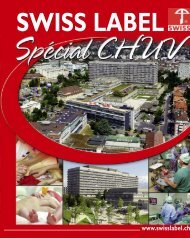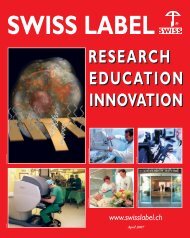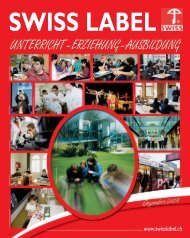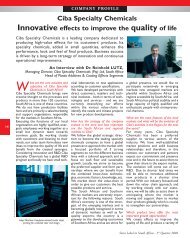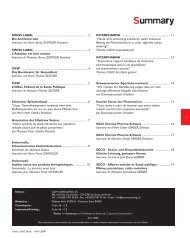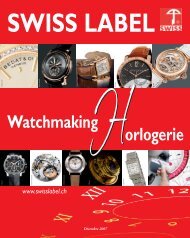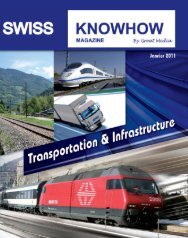swiss label - Com Consulting SA
swiss label - Com Consulting SA
swiss label - Com Consulting SA
Create successful ePaper yourself
Turn your PDF publications into a flip-book with our unique Google optimized e-Paper software.
Laura Sadis<br />
Member of the Consiglio di Stato<br />
Director of the Department<br />
of Finance and Economy<br />
In this climate of increased global competition between regional<br />
systems, skills and quality of life can make all the difference. The<br />
higher the skill levels the lower the risk of creating forms of<br />
temporary employment and social exclusion, an inherent danger in an<br />
ever more competitive economic system.<br />
For this reason the canton of Ticino – a small region in the heart of<br />
Europe, which with its skills and its specific regional, historical and<br />
cultural characteristics represents added value for the entire Swiss<br />
Confederation and enhances the value of the “made in Switzerland”<br />
brand all over the world – has made strengthening the link between<br />
education, work and economic growth a primary objective which over<br />
the next few years will continue to be the keystone to encouraging<br />
sustainable and durable economic growth, as well as social cohesion.<br />
Basic education and lifelong learning, research and the transfer of<br />
knowledge are fundamental tools for people and for companies, for<br />
dealing with change and for always being ready to accept new<br />
challenges, above all at times of crisis, which are met head on with<br />
enterprise and a capacity for planning, and not simply endured. On<br />
the other hand, we must also be conscious of the fact that, regardless<br />
of the economic cycle, we live in a society that is constantly asking us<br />
to respond in new and different ways. We live in a world undergoing<br />
constant and rapid transformation, the result both of change in the<br />
international economic system, which has become so much more<br />
competitive with markets that are ever more open and interconnected,<br />
and of technological development, with the advent of new types of<br />
employment and business management.<br />
In Ticino we have an infrastructure of industry and services to<br />
industry that has made strenuous efforts to innovate and remain<br />
competitive. In some areas there are pockets of excellence that are<br />
recognised all over the world. These are small and medium-sized<br />
enterprises that have made consistent investments in research and in<br />
training their employees and which therefore have a solid base from which<br />
they can overcome even the most difficult economic circumstances.<br />
Even in the financial sector – of which Ticino is the third largest market<br />
in Switzerland – the basic conditions exist for dealing with current<br />
developments in a positive way. Against the background of a bitter<br />
commercial battle over financial management at an international level,<br />
there is no doubt that certain external factors are changing forever the<br />
frame of reference for financial markets at both national and cantonal<br />
level. However, we have all the professional qualities, experience and<br />
tools needed to adapt to these changes and to create the added value<br />
that comes first and foremost from offering new services and skills at<br />
an ever higher level.<br />
Swiss Label Ticino 2010<br />
Department of Finance and Economy<br />
Skills and quality that make the difference<br />
Despite the serious international economic crisis, the Ticino economy<br />
still has some important trump cards that it can play to strengthen its<br />
regional competitiveness, from the financial sector to industry, from<br />
technological development to tourism, thanks to the entrepreneurial<br />
spirit and public policies that provide support in particular for<br />
training and research and for innovative activities with high added<br />
value.<br />
This commitment on the part of the government has remained<br />
constant despite the need to maintain strict control over the growth in<br />
public finances. And we must not forget that structurally sound public<br />
finances are essential to the appeal of the economic marketplace, not<br />
just in terms of fiscal pressure (in the last two years Ticino has seen<br />
some important reforms to the benefit of both businesses and private<br />
individuals), but also more generally to protect those public services<br />
and the ability to plan that are so indispensable for making a region<br />
competitive. Education, the way in which institutions work, security,<br />
mobility, sound management of the region and its environmental<br />
resources are all elements that cannot be separated from the instruments<br />
of economic growth in the strict sense of the word.<br />
The development policies implemented in the canton of Ticino are<br />
moving in this direction, in the belief that to consolidate the economic<br />
infrastructure, by developing skills and technological innovation and<br />
protecting jobs, it is necessary to maintain a series of effective and<br />
consistent conditions for businesses and for people’s quality of life,<br />
with durable and sustainable development models, within a framework<br />
of balance between urban centres and outlying areas and of making<br />
the best use all the resources the region has to offer.<br />
Dipartimento delle finanze e dell’economia<br />
Residenza governativa - CH-6500 Bellinzona<br />
Tel. 0041 91 814 44 60 - Fax 0041 91 814 44 23<br />
E-mail: dfe-dir@ti.ch - Website: www.ti.ch/dfe<br />
© DR<br />
5



